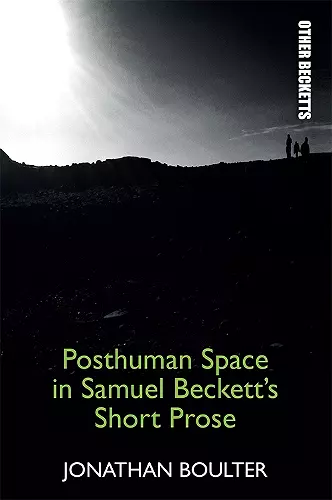Posthuman Space in Samuel Beckett's Short Prose
Rethinking identity and existence in Beckett's narratives
Format:Hardback
Publisher:Edinburgh University Press
Published:1st Mar '19
Currently unavailable, and unfortunately no date known when it will be back

This insightful exploration of posthuman themes in Beckett's short prose reveals how identity and existence are redefined in a complex, material world.
In Posthuman Space in Samuel Beckett's Short Prose, Jonathan Boulter delves into the complexities of Samuel Beckett's exploration of the human condition, particularly through the lens of the posthuman subject. The author presents a philosophical examination of how Beckett's short prose challenges traditional notions of humanity, offering readers a fresh perspective on what it means to exist in a world that transcends conventional categories of life and death. This inquiry into the posthuman subject reveals a compelling narrative that invites readers to reconsider their understanding of identity and existence.
Boulter's analysis highlights the radical dismantling of human identity that Beckett employs in his texts. By presenting characters that exist in a realm beyond life and death, the narratives push readers to confront the complexities of existence itself. Despite the challenging nature of these works, Boulter argues that they remain profoundly engaging, as the narrators inhabit recognizable, material spaces, creating a paradox that adds depth to the reading experience. The book examines how the concept of 'world' is redefined for these characters, who navigate an ecological space that complicates their understanding of being.
Ultimately, Posthuman Space in Samuel Beckett's Short Prose contributes significantly to the discourse surrounding Beckett's writings, particularly his short prose, which has often been overlooked. By rethinking Beckett's work in relation to the posthuman, Boulter opens new avenues for understanding the philosophical implications of Beckett's narratives and their relevance in contemporary discussions about identity and existence.
Boulter’s compelling book shows that one needs Heidegger and Blanchot as well as Hayles and Haraway to make sense of the textual strategies deployed by Beckett when he creates a spectral subjectivity after the decomposition of the subject. Beckett’s shorter texts, powerfully and systematically read with Blanchot and Heidegger, usher in a post-humanism whose positive yield is a new ecology of space, a space without subjective positioning, a space carved out by relentless fables of destitution, homelessness and powerlessness, just to show what remains after one has lost the world. * Jean-Michel Rabaté, University of Pennsylvania, American Academy of Arts and Sciences *
ISBN: 9781474430258
Dimensions: unknown
Weight: 482g
232 pages